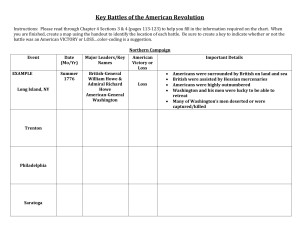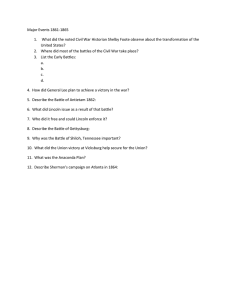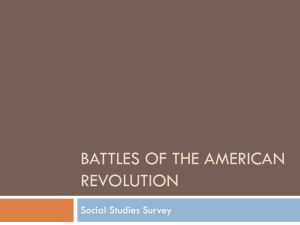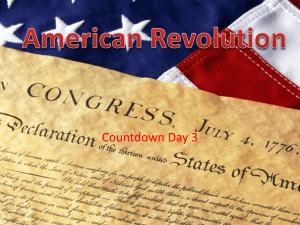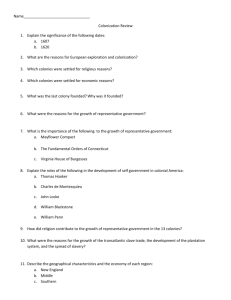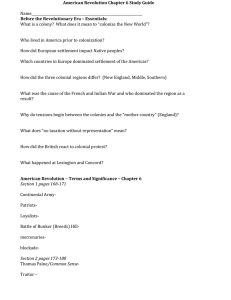American Revolution Chapter 6 Study Guide Name__________________________________________________________________
advertisement
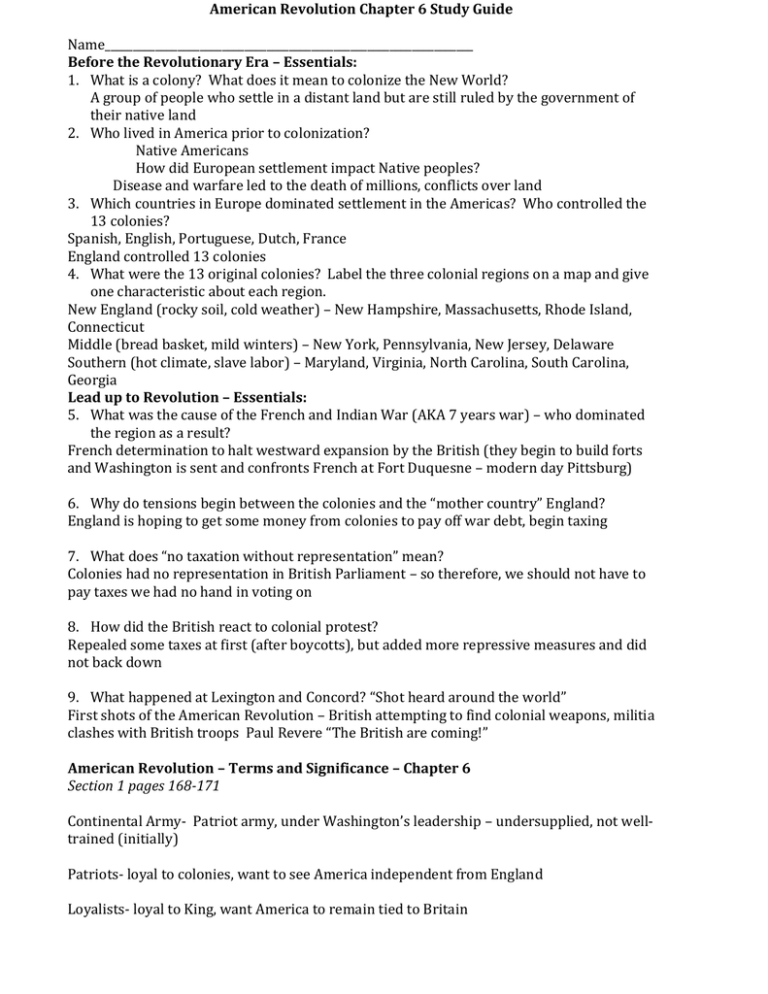
American Revolution Chapter 6 Study Guide Name__________________________________________________________________ Before the Revolutionary Era – Essentials: 1. What is a colony? What does it mean to colonize the New World? A group of people who settle in a distant land but are still ruled by the government of their native land 2. Who lived in America prior to colonization? Native Americans How did European settlement impact Native peoples? Disease and warfare led to the death of millions, conflicts over land 3. Which countries in Europe dominated settlement in the Americas? Who controlled the 13 colonies? Spanish, English, Portuguese, Dutch, France England controlled 13 colonies 4. What were the 13 original colonies? Label the three colonial regions on a map and give one characteristic about each region. New England (rocky soil, cold weather) – New Hampshire, Massachusetts, Rhode Island, Connecticut Middle (bread basket, mild winters) – New York, Pennsylvania, New Jersey, Delaware Southern (hot climate, slave labor) – Maryland, Virginia, North Carolina, South Carolina, Georgia Lead up to Revolution – Essentials: 5. What was the cause of the French and Indian War (AKA 7 years war) – who dominated the region as a result? French determination to halt westward expansion by the British (they begin to build forts and Washington is sent and confronts French at Fort Duquesne – modern day Pittsburg) 6. Why do tensions begin between the colonies and the “mother country” England? England is hoping to get some money from colonies to pay off war debt, begin taxing 7. What does “no taxation without representation” mean? Colonies had no representation in British Parliament – so therefore, we should not have to pay taxes we had no hand in voting on 8. How did the British react to colonial protest? Repealed some taxes at first (after boycotts), but added more repressive measures and did not back down 9. What happened at Lexington and Concord? “Shot heard around the world” First shots of the American Revolution – British attempting to find colonial weapons, militia clashes with British troops Paul Revere “The British are coming!” American Revolution – Terms and Significance – Chapter 6 Section 1 pages 168-171 Continental Army- Patriot army, under Washington’s leadership – undersupplied, not welltrained (initially) Patriots- loyal to colonies, want to see America independent from England Loyalists- loyal to King, want America to remain tied to Britain Battle of Bunker (Breeds) Hill- First major battle of the Revolution “Don’t shoot until you see the whites of their eyes” – British victory, but high casualties, shows fighting spirit of Americans mercenaries- soldiers for hire (Hessians hired by British to fight) blockade- shutting of a port to keep people or supplies from moving in or out Section 2 pages 173-180 Thomas Paine/Common Sense- Enlightenment thinker from England, moves to Philadelphia writes pamphlet in easy language for common people to understand arguing for independence, convinces many the time for revolution has come! Traitor – person who betrays his or her country Thomas Jefferson – main author of the Declaration of Independence John Adams – leading delegate at Continental Congress (from Virginia), early supporter of independence from England Benjamin Franklin – another leading delegate at C.C. (from PA), printer, politician, spend much time in England Enlightenment – intellectual movement in Europe that encourages questioning – think for yourself is the motto of the Enlightenment Voltaire – free speech Locke – Why do we need gov’t? In a state of nature your “natural right” (life, liberty and property) is not protected, also discussed right to revolution (if gov’t is not protecting your natural rights) – Jefferson borrows heavily from Locke when writing the Dec. of Ind. natural rights – rights all people have from birth, life, liberty, property Declaration of Independence & organization (what are the three main parts that follow the preamble?) – Natural rights, wrongs by king (grievances), independence Section 3 pages 181-185 Battle of Long Island – British victory, leads to British control of NY, Washington retreats Battle of Trenton, Princeton – Washington crosses the Delaware, attacks Hessian force in Trenton the day after Xmas, victory for Americans Washington leaves campfires burning to fool Cornwallis and achieves a victory at Princeton Germantown/Brandywine – Philadelphia, losses for Washington, Howe was supposed to meet up with British generals Burgoyne and Leger, but instead takes over Philadelphia and stays for the winter (this is harmful to British plan b/c he fails to provide reinforcements to Burgoyne who will in turn lose at Saratoga) Valley Forge – Washington retreats here following losses in Philadelphia, harsh winter, men lacking supplies, food, disease rampant throughout camp. Needed supplies arrive and improved weather make the situation much better Von Steuben – German military leader, trains men, teaches bayonet tactics, helps them leave Valley Forge a united and skilled force What was the British war strategy and why did it fail? To capture major cities, reinforcements don’t arrive in time, bad decisions by generals Saratoga – turning point battle, American victory, French aid begins allies/alliance – agreement between nations to aid one another (usually in war) Section 4 pages 186-190 How roles did women and African-Americans play in the Revolution? – women cook and aid at camps, make clothing, bullets, some even dress as men and fight, take over the jobs of men African-Americans – some join British who promise the enslaved freedom. Washington also allows freed African-Americans to fight (not at first but eventually changes policy) Why did many Native Americans side with the British? British convinced them that a Patriot victory would mean more land lost to them. Section 5 pages 191-195 guerilla tactics- nonconventional warfare – hit and run raids – Francis “Swamp Fox” Merion in South Carolina uses these tactics to frustrate the British Battle of Cowpens – use of unconventional warfare leads Americans to victory Battle of Yorktown – Last major battle of the war, Cornwallis retreats to a peninsula where he is trapped and is forced to surrender Siege – military blockade or bombardment of an enemy town or position to force surrender Why did the Americans win the war? – knowledge of geography, foreign assistance, patriotism/desire for independence, generals (Washington)

